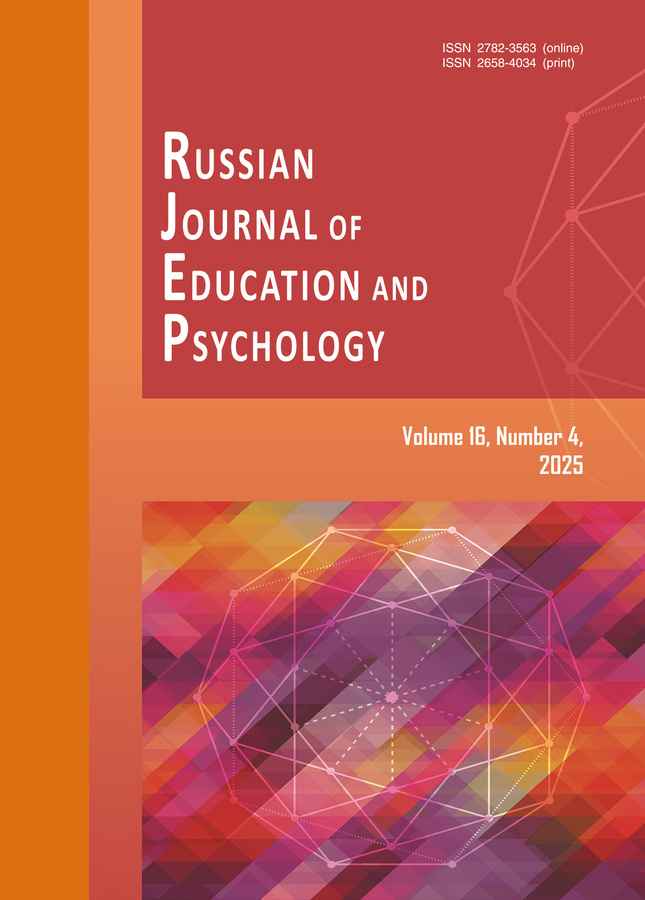The role of post-text exercises in the development of communication skills among students of non-linguistic universities (on the example of the Personal Management teaching English manual)
- Autores: Grishchenko N.A.1, Ershova A.I.1, Ershova E.O.1, Starsheva M.A.1
-
Afiliações:
- Siberian Federal University
- Edição: Volume 16, Nº 4 (2025)
- Páginas: 283-306
- Seção: Educational and Pedagogical Studies
- ##submission.datePublished##: 30.09.2025
- URL: https://journal-vniispk.ru/2658-4034/article/view/349002
- DOI: https://doi.org/10.12731/2658-4034-2025-16-4-901
- EDN: https://elibrary.ru/KUGTJO
- ID: 349002
Citar
Texto integral
Resumo
Background. In the context of foreign language teaching methodology, post-text exercises play a key role in ensuring the effective acquisition of language material. These exercises are aimed at consolidating lexical and grammatical structures, developing reading and comprehension skills, as well as developing the ability to communicate spontaneously in a foreign language. The use of authentic materials in post-text exercises allows students not only to improve their language skills, but also to gain a deeper understanding of the cultural characteristics and context in which the language they are learning functions. Authentic texts provide students with the opportunity to familiarize themselves with real language situations and linguistic norms, which contributes to a more natural and organic language acquisition.
The purpose of the study is to analyze the importance of post-text exercises in the process of learning a foreign language and demonstrate their role in consolidating acquired knowledge and improving students’ communication skills when using authentic materials.
Materials and methods. The study examines examples of exercises presented in the Personal Management ESSD manual, designed for teaching English. Their detailed description is given, as well as an analysis of their role in improving communication skills and developing sustainable language competencies.
Results. Post-text exercises based on authentic materials are an important component of foreign language teaching methods. They contribute not only to the consolidation of knowledge, but also to the development of communication skills, which is a necessary condition for achieving proficiency in a foreign language.
Sobre autores
Nataliia Grishchenko
Siberian Federal University
Email: NGrishchenko@sfu-kras.ru
ORCID ID: 0000-0003-0037-876X
Código SPIN: 4877-9656
PhD in Philology, Associate Professor, Associate Professor of Marketing and international Administration Department
Rússia, 79, Svobodny pr., Krasnoyarsk, 660041, Russian Federation
Alina Ershova
Siberian Federal University
Autor responsável pela correspondência
Email: АErshova@sfu-kras.ru
ORCID ID: 0009-0000-8654-1219
Código SPIN: 2122-5985
Assistant of Marketing and international Administration Department
Rússia, 79, Svobodny pr., Krasnoyarsk, 660041, Russian Federation
Evgenya Ershova
Siberian Federal University
Email: EErshova@sfu-kras.ru
ORCID ID: 0000-0003-2950-618X
Código SPIN: 5113-8960
PhD in Philology, Associate Professor, Associate Professor of Marketing and international Administration Department
Rússia, 79, Svobodny pr., Krasnoyarsk, 660041, Russian Federation
Maria Starsheva
Siberian Federal University
Email: MKozhevnikova@sfu-kras.ru
ORCID ID: 0000-0002-9099-4269
Código SPIN: 7490-0934
PhD in Philology, Associate Professor, Associate Professor of Marketing and international Administration Department
Rússia, 79, Svobodny pr., Krasnoyarsk, 660041, Russian Federation
Bibliografia
- Bim, I. L. (1988). Theory and practice of teaching German in secondary school: problems and prospects. Moscow: Prosveshchenie. 254 p. ISBN: 5-09-000873-6.
- Bogdanova, O. S. (2017). Linguodidactic justification of the effectiveness of teaching foreign language text activity. In: Discursive manifestation and communicative practice (pp. 202–210). Moscow: LLC «Languages of the World’s Peoples». EDN: https://elibrary.ru/YNVCEP
- Dorogaikina, E. M. (2018). Text activity within the framework of the discipline «Foreign Language». Modern Trends in Teaching Foreign Languages at Non-Linguistic Universities, (12), 31–36. EDN: https://elibrary.ru/YXHVVJ
- Zimnyaya, I. A. (2003). Key competencies — a new paradigm of educational outcomes. Higher Education Today, (5), 34–42. EDN: https://elibrary.ru/SMMBFV
- Kirillova, I. K., Bessonova, E. V., & Aleshugina, E. A. (2015). Dialogue of cultures: concepts for the development of linguistics and linguodidactics (pp. 51–61). Moscow: NI MGSU Publishing House. EDN: https://elibrary.ru/VOCQQZ
- Lebedev, O. E. (2004). Competency-based approach in education. School Technologies, (5), 3–12. EDN: https://elibrary.ru/SKEDIV
- Markova, A. K. (1993). Psychology of teaching: a teacher’s psychology. Moscow: Prosveshchenie. 192 p. ISBN: 5-09-003639-X. EDN: https://elibrary.ru/YQCKIH
- Milrud, R. P. (2005). English teaching methodology. Moscow: Drofa. 253 p.
- Passov, E. I. (1989). Foundations of the communicative methodology for teaching foreign language communication. Moscow: Russkiy Yazyk. 276 p.
- Passov, E. I. (1991). The communicative method of teaching foreign language speaking. Moscow: Prosveshchenie. 223 p.
- Salnikova, N. A. (2016). The system of working with professionally oriented foreign language texts in a technical university. In: Socio-economic and humanitarian research: challenges, trends, and development prospects (pp. 499–503). Bryansk: Bryansk State Agrarian University.
- Solovova, E. N. (2008). Methodology of teaching foreign languages: basic course. Moscow: Astrel. 238 p.
- Soluyanova, O. N. (2011). Developing general professional skills for working with information in foreign language teaching for non-linguistic university students: Candidate of Pedagogical Sciences dissertation abstract. Nizhny Novgorod. 21 p. EDN: https://elibrary.ru/QHJPGL
- Soluyanova, O. N. (2021). Teaching non-linguistic university students to work with professionally oriented foreign language texts. Baltic Humanitarian Journal, 10(1)(34), 265–269. https://doi.org/10.26140/bgz3-2021-1001-0061. EDN: https://elibrary.ru/IZGSEF
- Khutorsky, A. V. (2003). Key competencies: design technology. Narodnoe Obrazovanie (Public Education), (5), 55–61. EDN: https://elibrary.ru/SGUKWN
- Tsybaneva, V. A., Seredintseva, A. S., & Bokova, T. N. (2023). Approaches to foreign language teaching. Volgograd: Sfera Publishing House. 100 p. ISBN: 978-5-00186-144-7. EDN: https://elibrary.ru/GLLRVQ
- Yagubova, A. S. (2017). Teaching foreign language communication in home reading classes. Problems of Modern Pedagogical Education, (56-3), 275–282. EDN: https://elibrary.ru/ZGSTDX
- Canale, M., & Swain, M. (1980). Theoretical bases of communicative approaches. Applied Linguistics, 1(1), 1–47. https://doi.org/10.1093/applin/1.1
- Clear, J. (2018). Atomic habits. New York: Penguin Random House LLC. 285 p.
- Harmer, J. (2001). How to teach English. England: Longman Ltd. 208 p. (pp. 121–126).
- Long, M., & Doughty, C. J. (2011). The handbook of language teaching. Oxford: Blackwell Publishing Ltd. 812 p.
- Nunan, D. (2004). Designing tasks for the communicative classroom. Cambridge: Cambridge University Press. 222 p.
- Richards, J. C., & Rodgers, T. S. (2001). Approaches and methods in language teaching. Cambridge: Cambridge University Press. 248 p. https://doi.org/10.1017/CBO9780511667305
- Tracy, B. (1993). Maximum achievement. New York: Simon and Schuster Paperbacks. 351 p.
Arquivos suplementares










